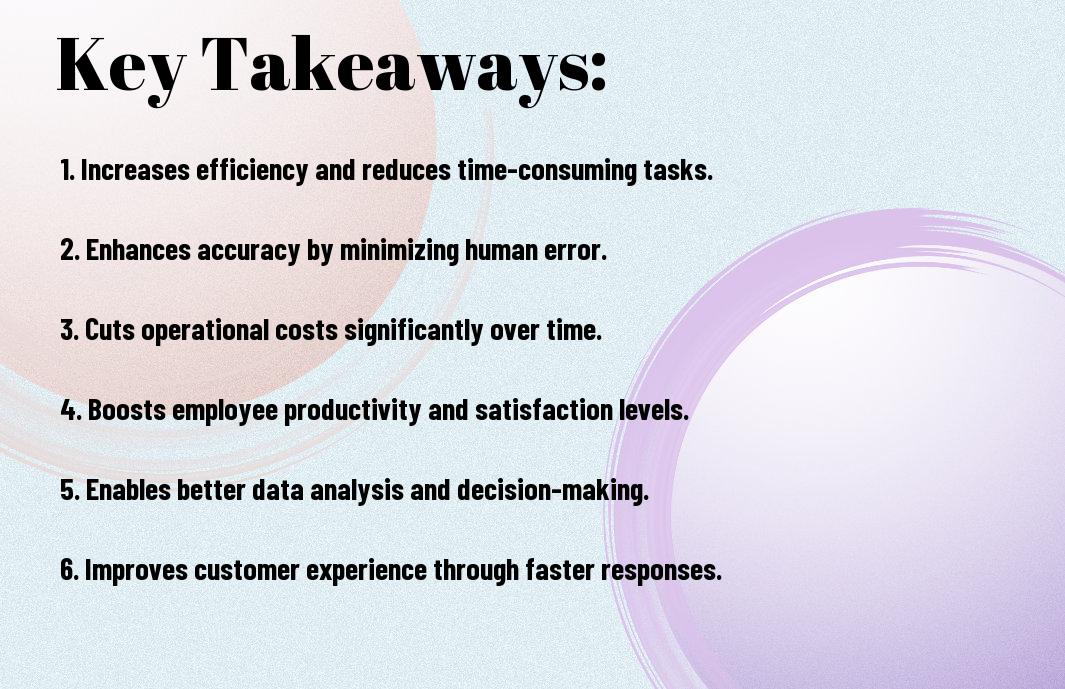You may be wondering how automation can significantly enhance your business operations. By incorporating automation, you can streamline processes, improve accuracy, and increase productivity, ultimately saving time and resources. This blog post will explore seven proven benefits of automation, showing you how it can transform your business workflow and help you stay competitive in today’s fast-paced market. Let’s examine the advantages that automation can bring to your enterprise.

Key Takeaways:
- Increased Efficiency: Automation streamlines processes, leading to quicker task completion and more productive use of time.
- Cost Savings: By reducing the need for manual labor and minimizing errors, businesses can significantly lower operational costs.
- Improved Accuracy: Automated systems decrease the likelihood of human errors, resulting in higher data accuracy and consistency.
- Enhanced Customer Experience: Automation enables quicker response times and personalized interactions, improving overall customer satisfaction.
- Scalability: Businesses can easily scale operations without proportional increases in resources, allowing for growth without added complexity.


Increased Efficiency
Before implementing automation, you may find your business processes bogged down by repetitive tasks and manual inputs. This can lead to wasted time and resources. By integrating automated solutions, you stand to benefit from increased efficiency, allowing your team to focus on more strategic initiatives that drive growth and innovation.
Streamlining Processes
At the heart of increased efficiency is the ability to streamline processes. Automation eliminates unnecessary steps and redundancies, creating a smoother workflow. This empowers you to manage tasks more effectively, leading to a faster turnaround time and improved productivity.
Reducing Human Error
One of the significant advantages of automation is its ability to reduce human error. When tasks are automated, they rely on programmed instructions rather than manual input, minimizing the chances of mistakes.
This reduction in human error translates to improved accuracy in your business operations. By automating data entry, report generation, and other routine tasks, you can ensure consistent results and avoid costly mistakes. This not only enhances your credibility with clients and partners but also saves you time and resources that would otherwise be spent on correcting errors. In turn, this allows your team to focus on more complex challenges that require critical thinking and creativity.
Cost Reduction
Even as businesses strive to maintain competitiveness, automation presents a powerful avenue for cost reduction. By streamlining processes and enhancing efficiency, you can significantly decrease operational expenses. To explore more about this, check out The 7 Core Benefits and Advantages of Using AI in Business.
Lower Operational Costs
With automation, your operations become more efficient, allowing you to cut down on various overhead expenses. By implementing automated systems, you streamline tasks that would otherwise require significant time and resources, resulting in a tangible decrease in your overall costs.
Minimizing Labor Expenses
Across industries, businesses are utilizing automation to minimize labor expenses. By adopting automated technologies, you can reduce the need for manual labor, enabling you to allocate your workforce more effectively and cut costs on salaries and benefits.
For instance, if your business relies heavily on data entry tasks, automated software can handle these functions with accuracy and speed. By shifting routine work to automation, you can focus your team’s efforts on higher-value projects, effectively lowering labor costs while enhancing productivity. This strategy not only saves you money but also empowers your workforce to engage in more meaningful and fulfilling work.
Enhanced Accuracy
Once again, automation in business significantly enhances accuracy by minimizing human error. By relying on automated systems for tasks such as data entry and analysis, you can ensure that your business processes are carried out with high precision. This not only leads to better outcomes but also helps you maintain a positive reputation in your industry, as stakeholders appreciate the reliability that comes with reduced mistakes.
Consistency in Output
By implementing automated systems, you ensure that the quality of your output remains consistent. Automation eliminates the variability caused by human factors, allowing you to deliver reliable results every time. This consistency fosters trust among your clients and partners, making your operations more predictable and effective.
Precision in Data Handling
Against the backdrop of traditional manual methods, automation allows for superior data handling precision. This means that your data is not only processed quickly but also accurately, reducing the risk of discrepancies. When you manage large datasets, the accuracy provided by automation becomes a game-changer for your decision-making processes.
Consequently, the ability to handle data with precision leads to more informed decisions and strategic planning. You can analyze trends and patterns with confidence, knowing that the information you’re working with is reliable. This level of accuracy not only enhances your operational efficiency but also positions your business for sustainable growth, as you can allocate resources based on well-informed insights.
Improved Customer Experience
Many businesses benefit from automation by enhancing their customer experience. With streamlined processes and efficient systems in place, you can meet your customers’ needs more effectively. This leads to higher satisfaction rates, as customers feel valued when they receive timely responses and accurate information. Ultimately, automation enables you to create a more pleasant interaction, fostering long-term loyalty and trust between your brand and its clientele.
Faster Response Times
Faster response times are one of the most noticeable impacts of automation. By automating routine inquiries and processes, you can significantly reduce the time it takes to address customer requests. This ensures that you are always available to your customers, providing them with immediate assistance and support when they need it most.
Personalized Services
About two-thirds of consumers prefer personalized services when interacting with your business. Automation allows you to gather and analyze customer data efficiently, enabling you to tailor your offerings according to individual preferences. This bespoke approach not only boosts customer satisfaction but also helps in building a meaningful connection with your audience.
With automated systems in place, you can track customer behaviors and purchase history to deliver targeted communications, promotions, and recommendations. This level of personalization allows you to provide relevant content and offers that resonate with your customers, making them feel understood and valued. As a result, your relationship with clients strengthens, leading to increased retention and loyalty in the long run.
Scalability
Keep in mind that automation can significantly enhance your business’s scalability. By streamlining processes and minimizing manual efforts, you can easily adapt to varying market demands without compromising quality or efficiency. Automation allows you to deploy resources more effectively, enabling your business to grow at a sustainable pace while controlling costs.
Adapting to Growth
With automation, you can swiftly adjust your operations to meet increasing demands. This flexibility allows you to scale your business processes seamlessly, ensuring that you are prepared for expansion without the headaches of manual adjustments. As your business grows, automation provides the tools necessary to manage changing circumstances effectively.
Managing Increased Demand
Growth often brings the challenge of managing increased demand. You want to ensure your operations can handle this change without delays or errors impacting customer satisfaction. Automation helps you streamline workflows, allowing your team to focus on higher-value tasks while processes run smoothly in the background.
Even with a surge in customer orders or services, automation can maintain your productivity levels. By automating repetitive and time-consuming tasks, you minimize the risk of bottlenecks that could arise during peak periods. This proactive approach not only enhances efficiency but also allows you to allocate resources strategically, ensuring that you consistently meet customer expectations. Furthermore, automation helps maintain a high standard of quality even as your business demands increase, allowing you to focus on innovation and growth without sacrificing service excellence.
Data Analysis and Insights
After implementing automation in your business, you gain access to powerful data analysis tools that can transform raw data into meaningful insights. These tools streamline data collection and processing, allowing you to identify trends, patterns, and anomalies more efficiently. With accurate data at your fingertips, you can make informed decisions that drive your business strategy forward, ultimately enhancing your competitiveness in the market.
Real-Time Reporting
For businesses seeking agility, real-time reporting provides an immediate view of performance metrics and critical data points. This capability enables you to monitor operations continuously, quickly identifying areas that require immediate attention, thus allowing you to make swift adjustments when necessary. Real-time insights not only foster proactive management but also enhance transparency within your teams.
Enhanced Decision-Making
To elevate your decision-making process, automation equips you with comprehensive visualizations and analytics that simplify complex data sets. By automating the synthesis of information, you gain clearer perspectives on business performance, which can lead to quicker and more effective strategic choices.
And with enhanced decision-making comes the ability to pivot your strategies based on real-time insights. You can easily assess scenarios, forecast outcomes, and identify the most impactful actions to take. This agility improves resource allocation and risk management, allowing you to stay ahead of competitors and adapt to changing market conditions with confidence.
Final Words
The 7 proven benefits of automation in business can significantly enhance your operations, increase productivity, and improve your bottom line. By streamlining processes and reducing human error, you allow your team to focus on higher-value tasks. Whether it’s boosting efficiency, cutting costs, or enhancing customer experience, automation provides you with the tools to stay competitive. To explore more about the advantages and implementation of automation, you can check out How Automation Can Help Your Business.
FAQ
Q: What are the main benefits of automation in business?
A: Some of the main benefits include increased efficiency, cost savings, enhanced accuracy, improved data management, better customer service, scalability, and more focus on strategic tasks. Automation allows businesses to streamline operations, reduce human error, and allocate resources more effectively.
Q: How does automation increase efficiency in business processes?
A: Automation speeds up repetitive tasks and reduces the time taken for operations. By implementing automated workflows, organizations can significantly reduce task completion time, allowing employees to focus on more strategic functions that require human intervention. This leads to smoother operations and higher productivity.
Q: In what ways does automation contribute to cost savings?
A: Automation reduces labor costs associated with manual processes, minimizes operational costs through better resource management, and decreases the likelihood of costly errors. This direct financial impact can lead to substantial savings over time, making it a financially sound investment for businesses of all sizes.
Q: How does automation enhance accuracy in business operations?
A: Automated systems are designed to perform tasks consistently and precisely without the influence of human error. By relying on automated tools for data entry, calculations, and reporting, businesses can ensure a higher level of accuracy in their operations, which is vital for maintaining reliability in outputs.
Q: What role does automation play in improving customer service?
A: Automation tools, such as chatbots and automated email responses, enable businesses to provide timely and efficient customer support. By handling inquiries promptly and ensuring that routine questions are answered, businesses can improve customer satisfaction and free up representatives to handle more complex issues.
Q: Can automation help businesses scale their operations? How?
A: Yes, automation allows businesses to scale operations more effortlessly. By implementing systems that can handle increased volumes of work without the need for proportionally increasing labor, businesses can grow their customer base and operations without compromising on service quality.
Q: How does automation allow businesses to focus on strategic tasks?
A: With automation taking care of repetitive and time-consuming tasks, employees can dedicate more time and energy to strategic decision-making and creative problem-solving. This shift in focus can lead to innovation and improved business performance, as teams will have more bandwidth to pursue growth opportunities.


